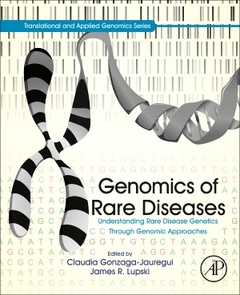Description
Genomics of Rare Diseases
Understanding Disease Genetics Using Genomic Approaches
Translational and Applied Genomics Series
Coordinators: Gonzaga-Jauregui Claudia, Lupski James R.
Language: English
Keywords
Aneuploidy; Association analysis; Autosomal dominant inheritance; Autosomal recessive inheritance; Carrier frequency; Chromosomal abnormality; Chromosome; Clan Genomics; Clinical cytogenetics; Complex inheritance; Consanguinity; Copy-number variation; De novo mutation; Deletion; Digenic inheritance; Dominant negative; Duplication; EHR; Electronic health records; Exome; Founder effect; Founder population; GWAS; Gain of function; Gene; Gene expression; Genetic drift; Genetics; Genome-wide association study; Genomic disorders; Genomic rearrangements; Genomic representation; Genomic sequencing; Genomics; Haploinsufficiency; Heteroplasmy; Homoplasmy; Human genome; Incomplete penetrance; Inversion; Karyotype; Linkage analysis; Mendelian genetics; Mitochondria; Mitochondrial disorder; Mitochondrial genome; Molecular profiling; Molecular therapy development; Mosaic; Mosaicism; Multiple molecular diagnoses; Mutation; Mutation rate; Mutational burden; NGS; Next-generation sequencing; Phasing; Precision health; Precision medicine; RNA sequencing; RNA-seq; Rare diseases; Recessive disorders; Skewing; Somatic; Sporadic disorder; Statistical genetics; Structural variation; Transcriptomics; Translocation; Uniparental disomy; Variable expressivity; WES; WGS; X-chromosome inactivation; X-linked disorder; X-linked inheritance
316 p. · 19x23.4 cm · Paperback
Description
/li>Contents
/li>Readership
/li>Biography
/li>Comment
/li>
Genomics of Rare Diseases: Understanding Disease Genetics Using Genomic Approaches, a new volume in the Translational and Applied Genomics series, offers readers a broad understanding of current knowledge on rare diseases through a genomics lens. This clear understanding of the latest molecular and genomic technologies used to elucidate the molecular causes of more than 5,000 genetic disorders brings readers closer to unraveling many more that remain undefined and undiscovered. The challenges associated with performing rare disease research are also discussed, as well as the opportunities that the study of these disorders provides for improving our understanding of disease architecture and pathophysiology.
Leading chapter authors in the field discuss approaches such as karyotyping and genomic sequencing for the better diagnosis and treatment of conditions including recessive diseases, dominant and X-linked disorders, de novo mutations, sporadic disorders and mosaicism.
2. Karyotyping as the first genomic approach
3. Genomic disorders
4. Genomic sequencing of rare diseases
5. Recessive diseases and founder genetics
6. Dominant and de novo disorders
7. X-linked and mitochondrial disorders
8. Mosaicism in rare disease
9. Dual diagnoses of rare disorders
10. Statistical approaches to rare disease analyses
11. Transcriptomics in rare diseases
12. Other omics approaches to the study of rare diseases
13. Challenges and opportunities in rare diseases research
Active researchers; basic and translational scientists; clinicians in the areas of rare disease, human genetics, human genomics; translational researchers in genetic and genomic medicine, epigenetics, neuroscience, internal medicine, oncology, psychiatry, neurology, immunology, embryology, endocrinology, bioinformatics, prenatal testing, psychology, psychiatry, and genetic testing; genetic counselors; rare disease specialists; fertility specialists; bioethicists; hospital administrators
Jim Lupski is Cullen Professor of Molecular and Human Genetics and Professor of Pediatrics. He received his initial scientific training at Cold Spring Harbor Laboratory as an Undergraduate Research Participant (URP) and at New York University receiving his undergraduate degree in chemistry and biology (1979), completing the MD/PhD program in 1985. In 1986, moved to Houston, Texas for clinical training in pediatrics (1986-1989) and medical genetics (1989-1992), then establishing his laboratory at Baylor College of Medicine. Jim is an elected member of AAAS (1996), ASCI (1998), IOM/NAM (2002), and American Academy of Arts and Sciences (2013). For his work in human genomics and elucidation of genomic disorders, he received a DSc honoris causa in 2011 from the Watson School of Biological Sciences at CSHL. H
- Compiles applied case studies and methodologies, enabling researchers, clinicians and healthcare providers to effectively classify DNA variants associated with disease and patient phenotypes
- Discusses the main challenges in studying the genetics of rare diseases through genomic approaches and possible or ongoing solutions
- Explores opportunities for novel therapeutics
- Features chapter contributions from leading researchers and clinicians




